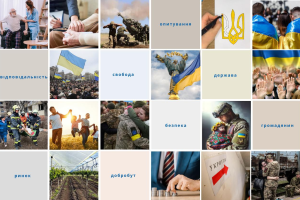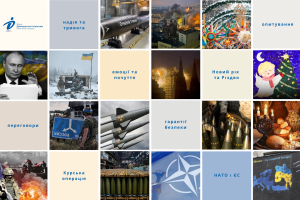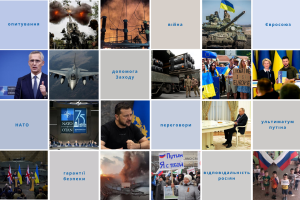Public opinion on policy honoring victims of Nazi and Soviet totalitarian regimes’ crimes during World War II
The all-Ukrainian survey was conducted by the Democratic Initiatives Foundation together with the Kyiv International Institute of Sociology in May-June 2021. The field part of the research lasted from 1st to 7th of June 2021. The survey used the computer-assisted telephone interview method (CATI). 2003 interviews were conducted over the course of the research.
Sample statistical error (with .95 probability and 1.1 design effect) does not exceed:
2.4% for indicators close to 50%
2.1% for indicators close to 25 or 75%
1.5% for indicators close to 10 or 90%
1.1% for indicators close to 5 or 95%
.5% for indicators close to 1 or 99%
The survey was financed within the framework of the MATPA project of the Dutch Embassy in Ukraine.
Ukrainian citizens’ attitude towards honoring those who died in the Babyn Yar.
55% of respondents claim they know that the Babyn Yar is located in Kyiv, 26% said they don’t know. 18% more named a different city. Respondents from the central regions were the most accurate (68%). Close to a third of all surveyed in the western and southern regions and Donbas could not answer the question.
37.5% of respondents see the Babyn Yar as a place of commemoration of the Nazi regime victims of all nationalities (Jews, Ukrainians, Russians, Romas), 27% more think of it as commemoration place of Ukrainian Jews who were victims of the Holocaust. For 14% of respondents, it is a place that reminds of victims of both, the Nazi and Soviet totalitarian regimes, while 11% call it a place of remembrance of soviet citizens of different nationalities. Only 9% found it hard to answer.
The absolute majority of all interviewees (76%) believe that memory of victims in the Babyn Yar should be honored on the state level. Only for 11% is it an issue of the local level. Only 4% call it a minority matter and 5% do not care at all.
Most of the respondents believe that the state should allocate the funds to honor the Nazi crime victims: Ukrainian Institute of National Memory (48%), the Verkhovna Rada (39%), the President (34.5%).
Similarly, the majority of respondents consider establishment of the Babyn Yar memorial and museum and the state’s participation in it as compulsory: 39% chose the case, in which the state works with private foreign patrons, 22% believe that funds should come straight from Ukraine’s national budget only, 13.5% believe the state should work with Ukrainian patrons. Financing the project with domestic patrons’ money only enjoys support of 6% of respondents, foreign ones – 4%.
86% of respondents view foreign financing of historical and cultural institutions in Ukraine mostly positively. Only 15% hold different opinions.
However, the foreigners’ nationality plays a big role in creating memorial sites to honor the victims of Nazi regime during the World War II. Specifically, Ukrainians favor Israeli citizens: their participation is approved by 81% of respondents (against 13%). 77% approve of patron from Germany (16% - do not), patrons from the USA – 70%.
At the same time, the attitudes toward involvement of Russian businessmen in creation of memorial places: 48% of respondents are against it, 43% - approve and 8% could not answer. One could draw clear distinctions between macro regions in this case: the western and central regions view Russian involvement as mostly negatively (65% and 51% respectively), in the eastern, southern and Donbas regions – mostly positively (56%, 57% and 63% respectively).
Russian citizens’ involvement in commemorative activities, such as Babyn Yar, will only lead to division in the Ukrainian society.
Opinion on compensation by countries for crimes committed against Ukrainian residents by their respective totalitarian regimes during World War II.
Ukraine and its population’s interests were not represented after the end of World War 2 during negotiations between anti-Hitler coalition member states regarding Germany’s future and its responsibility for the war crimes. Similarly, the question of holding the Stalin regime accountable for its war crimes against Ukrainians and Crimean Tatars in 1944-45 could not be raised before the fall of the Soviet Union.
The question of reparations remains open in Ukraine-Germany and Ukraine-Russia affairs. In the light of recent Russian aggression against Ukraine and Germany’s historical responsibility for peace in Europe, the reparations gain a special status. As a result, DIF became interested in the public opinion on these compensations. The opinion may become central for further political and diplomatic decisions of the Ukrainian government.
61% of respondents support (36.2% fully and 26.6% partially) the idea of pressing demands from Germany for Nazi crimes: mass executions of civilians, prisoners of war, guerilla fighters, UPA fighters, forced labor and deportation. 31.5% oppose such an idea. This idea enjoys absolute majority support across all macroregions.
55.3% of respondents (36.2% fully and 19.1% partially) support the idea of pressing demands from Russia for Stalinism’s crimes: deportation of Ukrainian and Crimean Tatars. 35.7% do not support this initiative. It enjoys the most popularity in the western regions (66.7%) the least – in Donbas (33.5%).
Survey results
Please, tell us where is the Babyn Yar located?
DO NOT READ THE ANSWER OPTIONS (% of all respondents)
100% in the column | Ukraine | West | Center | South | East | Donbas |
Kyiv city | 55.0 | 46.1 | 67.6 | 46.0 | 53.6 | 44.6 |
Other | 18.4 | 20.6 | 12.5 | 23.0 | 21.6 | 22.4 |
DON’T KNOW | 26.4 | 33.3 | 19.4 | 31.1 | 24.5 | 32.4 |
REFUSE TO ANSWER | 0.3 | 0.0 | 0.5 | 0.0 | 0.3 | 0.5 |
What does the Babyn Yar mean for you? ONE ANSWER
(% of all respondents)
100% in the column | Ukraine | West | Center | South | East | Donbas |
A place to honor Ukrainian Jews-victims of Holocaust | 27.3 | 28.1 | 28.8 | 28.2 | 23.6 | 26.3 |
A place to honor victims of the Nazi regime, people of all nationalities (Jews, Ukrainians, Russians, Romas) | 37.5 | 33.5 | 38.2 | 34.5 | 43.5 | 36.9 |
A place to honor victims of totalitarian regimes, Nazi and Soviet alike | 14.3 | 19.5 | 13.9 | 13.9 | 9.2 | 10.3 |
A place to honor victims of the Nazi regime – Soviet citizens of all nationalities | 10.9 | 8.8 | 10.2 | 12.7 | 13.9 | 10.7 |
Other | 1.1 | 0.7 | 1.4 | 0.5 | 1.7 | 1.2 |
HARD TO SAY | 8.9 | 9.3 | 7.5 | 10.3 | 8.2 | 14.7 |
What is your opinion on honoring those who was murdered in the Babyn Yar?
ONE ANSWER (% of all respondents)
100% in the column | Ukraine | West | Center | South | East | Donbas |
Should be honored on a national level | 76.0 | 78.9 | 75.0 | 80.1 | 75.1 | 64.8 |
Should be honored on a local level | 10.5 | 9.9 | 12.6 | 10.9 | 6.5 | 13.4 |
A minority matter | 3.6 | 2.4 | 4.6 | 1.8 | 4.1 | 4.4 |
Generally, do not care how this would be done | 5.4 | 5.7 | 3.5 | 3.6 | 8.0 | 9.7 |
HARD TO SAY | 4.5 | 3.1 | 4.3 | 3.6 | 6.2 | 7.8 |
In your opinion, who should decide the structure and the content of the memorial events to honor victims of Nazi crimes in Ukraine? Mark everything that fits.
TO BE READ IN RANDOM ORDER (% of all respondents)
% in the column | Ukraine | West | Center | South | East | Donbas |
Verkhovna Rada of Ukraine | 38.6 | 39.7 | 38.7 | 40.7 | 37.7 | 32.6 |
The President of Ukraine | 34.5 | 34.4 | 34.6 | 34.0 | 33.7 | 37.0 |
The Cabinet of Ministers of Ukraine | 19.6 | 18.8 | 21.3 | 20.2 | 18.6 | 16.1 |
Ukrainian Institute of National Memory | 48.0 | 49.5 | 51.0 | 44.6 | 44.4 | 42.3 |
Other | 3.9 | 1.8 | 3.5 | 5.1 | 7.7 | 1.1 |
HARD TO SAY | 6.5 | 6.9 | 6.1 | 3.9 | 5.8 | 14.0 |
Who should fund the construction of memorial and a museum in the Babyn Yar?
ONE ANSWER (% of all respondents)
100 % in the column | Ukraine | West | Center | South | East | Donbas |
Only the Ukrainian government via national budget | 21.6 | 24.7 | 17.8 | 29.8 | 21.0 | 16.7 |
The state and patrons-citizens of Ukraine | 13.5 | 15.6 | 14.8 | 11.8 | 10.5 | 9.9 |
The state and patrons-citizens of any country | 39.2 | 38.3 | 40.5 | 34.8 | 40.2 | 40.4 |
Patrons-citizens of Ukraine | 4.1 | 4.7 | 3.6 | 5.5 | 3.8 | 3.2 |
Patrons-citizens of any country | 5.8 | 7.0 | 5.2 | 4.9 | 6.5 | 3.8 |
I do not express concern as to who funds the construction | 11.4 | 6.1 | 14.3 | 8.6 | 13.0 | 17.9 |
Hard/Refuse to say | 4.3 | 3.6 | 3.8 | 4.6 | 5.0 | 8.1 |
What is your opinion about foreigners financing historical events, institutions of historical memory and cultural institutions (museums, memorials) in Ukraine?
ONE ANSWER (% of all respondents)
100 % in the column | Ukraine | West | Center | South | East | Donbas |
Mostly positive | 81.8 | 85.0 | 85.8 | 78.0 | 74.0 | 76.6 |
Mostly negative | 15.0 | 13.4 | 10.2 | 18.8 | 21.7 | 19.8 |
Hard/refuse to say | 3.3 | 1.5 | 4.0 | 3.3 | 4.3 | 3.6 |
What is your attitude about the businessmen from the different countries participating in creation of memorial places in Ukraine to honor victims of Nazi crimes during the World War II?
TO BE READ IN A RANDOM ORDER
Israel (% of all respondents)
100 % in the column | Ukraine | West | Center | South | East | Donbas |
Completely positive | 39.6 | 37.1 | 41.6 | 45.5 | 37.7 | 33.9 |
Mostly positive | 41.7 | 41.5 | 41.9 | 38.3 | 44.1 | 40.2 |
Mostly negative | 6.8 | 11.4 | 4.3 | 5.1 | 6.3 | 5.9 |
Completely negative | 5.8 | 5.6 | 4.6 | 7.8 | 6.4 | 8.2 |
Hard/Refuse to say | 6.1 | 4.3 | 7.6 | 3.3 | 5.6 | 11.8 |
Germany (% of all respondents)
100 % in the column | Ukraine | West | Center | South | East | Donbas |
Completely positive | 35.6 | 33.5 | 37.3 | 37.8 | 35.4 | 32.0 |
Mostly positive | 41.6 | 42.3 | 40.7 | 36.3 | 44.3 | 44.7 |
Mostly negative | 8.6 | 13.0 | 7.6 | 6.1 | 6.4 | 7.1 |
Completely negative | 7.5 | 6.4 | 7.1 | 12.2 | 7.2 | 7.0 |
Hard/Refuse to say | 6.6 | 4.7 | 7.3 | 7.6 | 6.7 | 9.3 |
Russia (% of all respondents)
100 % in the column | Ukraine | West | Center | South | East | Donbas |
Completely positive | 18.0 | 12.7 | 16.0 | 23.9 | 22.2 | 27.6 |
Mostly positive | 25.6 | 16.4 | 23.6 | 33.0 | 33.8 | 35.8 |
Mostly negative | 16.5 | 21.1 | 18.1 | 9.7 | 13.4 | 10.3 |
Completely negative | 31.7 | 43.9 | 33.0 | 25.7 | 22.2 | 13.4 |
Hard/Refuse to say | 8.2 | 5.8 | 9.3 | 7.7 | 8.4 | 12.8 |
USA (% of all respondents)
100 % in the column | Ukraine | West | Center | South | East | Donbas |
Completely positive | 30.3 | 31.7 | 33.6 | 30.2 | 27.1 | 16.7 |
Mostly positive | 40.3 | 44.1 | 41.6 | 38.2 | 37.1 | 30.9 |
Mostly negative | 10.9 | 10.6 | 8.9 | 10.5 | 14.6 | 12.9 |
Completely negative | 11.3 | 7.5 | 8.9 | 16.2 | 13.4 | 24.5 |
Hard/Refuse to say | 7.2 | 6.2 | 7.0 | 4.8 | 7.7 | 15.0 |
What do you think of idea that Ukraine can demand reparations for the crimes against civilians during the World War II?
TO BE READ IN A RANDOM ORDER (% of all respondents)
From Germany for the Nazi regime crimes: mass executions of civilians, prisoners of war guerillas, UPA fighters and forced labor.
100% in the column | Ukraine | West | Center | South | East | Donbas |
Fully support | 34.5 | 34.8 | 36.4 | 36.5 | 32.6 | 25.1 |
Mostly support | 26.6 | 33.3 | 25.3 | 19.3 | 22.2 | 31.5 |
Mostly do not support | 16.4 | 12.4 | 16.0 | 18.4 | 21.0 | 17.8 |
Do not support | 15.1 | 12.4 | 15.4 | 15.4 | 17.0 | 18.1 |
Hard/Refuse to say | 7.5 | 7.1 | 6.9 | 10.5 | 7.3 | 7.5 |
From Russia for the Stalin’s regime crimes: deportations of Crimean Tatars and Ukrainians
100% in the column | Ukraine | West | Center | Center | East | Donbas |
Fully support | 36.2 | 44.5 | 41.4 | 30.8 | 24.1 | 19.8 |
Mostly support | 19.1 | 22.2 | 19.1 | 16.1 | 18.5 | 13.7 |
Mostly do not support | 16.2 | 12.0 | 14.3 | 20.3 | 22.4 | 18.1 |
Do not support | 19.5 | 13.3 | 17.9 | 22.9 | 25.1 | 30.4 |
Hard/Refuse to say | 9.0 | 8.0 | 7.4 | 9.9 | 9.8 | 18.0 |
All respondents were 18 years of age and older, living, exclusively, on the Ukraine-controlled territories (the sample does not include residents of Crimea, Sevastopol and ORDLO). The interview was conducted either in Russian or Ukrainian as per respondent’s choice. The adult population distribution according to the macroregion and settlement type was defined by the Central Election Committee data on the 2019 parliament election (according to the number of registered voters). The sex-age structure was defined by State Statistical Service data as of 1st of January 2020. To make the sample more representative of the population’s structure, special statistical weights were built. Besides, these weights include probability random respondents enter into the sample (depending on the number of mobile numbers which a given respondent possesses).
The following show the composition of macroregions: West – Volyn, Rivne, Ivano-Frankivsk, Ternopil, Zakarpattia, Khmelnytskyi, Chernivtsi regions; Center – Vinnytsia, Zhytomyr, Sumy, Chernihiv, Poltava, Kirovograd, Cherkasy, Kyiv regions, Kyiv city; South – Mykolaiv, Kherson, Odesa; East – Dniprpetrovsk, Zaporizhia, Kharkiv regions; Donbas – Donetsk, Luhansk regions.








